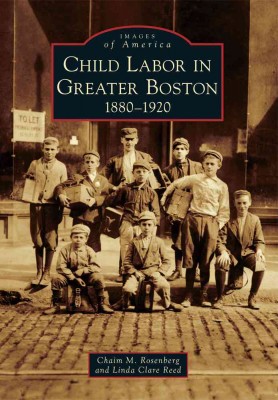| Child Labor in Greater Boston: 1880-1920 Contributor(s): Rosenberg, Chaim M. (Author), Reed, Linda Clare (Author) |
|
 |
ISBN: 1467121061 ISBN-13: 9781467121064 Publisher: Arcadia Publishing (SC) OUR PRICE: $22.49 Product Type: Paperback - Other Formats Published: February 2014 |
| Additional Information |
| BISAC Categories: - History | United States - State & Local - New England (ct, Ma, Me, Nh, Ri, Vt) |
| Dewey: 974 |
| Series: Images of America (Arcadia Publishing) |
| Physical Information: 0.33" H x 6.49" W x 9.34" (0.69 lbs) 128 pages |
| Themes: - Locality - Boston-Worcester, Mass. - Geographic Orientation - Massachusetts - Cultural Region - New England |
| Descriptions, Reviews, Etc. |
| Publisher Description: From its earliest days, Boston decreed that its children be taught to read and write English and understand the laws. In 1826, free and compulsory education was introduced. The wish to educate the young conflicted with the great need for unskilled labor in the fields and factories. With adult wages low, schoolchildren helped their families by selling newspapers, shining shoes, hawking goods, or scavenging. On reaching 14 years of age, many children left school to find full-time work. Fearing that these children would end up in low-paying, dead-end jobs, Boston Public Schools added trade schools to teach craft skills carpentry, printing, and metalwork for boys; dressmaking, cooking, and embroidery for girls. The national struggle to ban child labor began in the mid-19th century and ended with the passage of the Fair Labor Standards Act of 1938. This book describes the efforts in Boston and surrounding towns to keep children in school, at least until age 16, before permitting them to start work. The bulk of the images included were taken by Lewis Wickes Hine during his several visits to Boston between 1909 and 1917." |
Contributor Bio(s): Rosenberg, Chaim M.: - Chaim M. Rosenberg has written books about the industries of Massachusetts, child labor in America, and the American Industrial Revolution. Linda Clare Reed holds a bachelor of arts degree from Brown University and a master of education degree from Lesley University. She is affiliated with Boston University. |